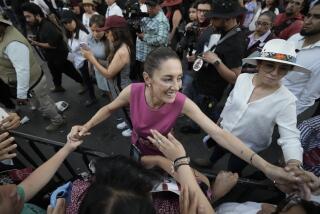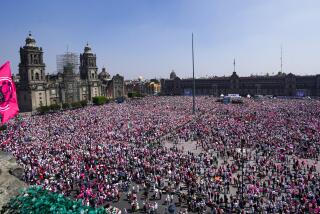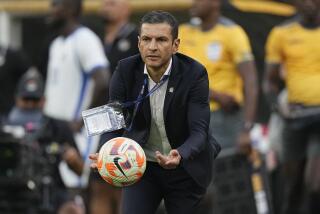Mexico Conservative Claims Win as Chaos Fears Ease
Conservative candidate Felipe Calderon appeared close to victory today in Mexico’s presidential election, but leftist Andres Manuel Lopez Obrador said he would not yet concede defeat.
With 97.6% of polling stations reporting, Calderon led Lopez Obrador by 372,000 votes with an estimated 1 million ballots still to be counted.
“We won, yes, by a narrow margin,” Calderon said in a television interview today. “It’s time to recognize the result. It’s not my triumph — it’s the triumph of the Mexican people.”
Lopez Obrador claimed in a fiery election night speech Sunday to have won an “irreversible” victory. Moments later, Calderon claimed victory, too, even though Mexican election officials had said the result was too close to call.
This morning, Lopez Obrador said in a television interview he would accept defeat if election officials certified a Calderon victory, but added that his campaign had noted the “tendency that is not normal” in the official count.
“Any candidate or party has the right to review the documentation” of the vote count, Lopez Obrador told the Televisa network. “All I’m asking is that we be allowed to verify the data.”
Officials from Lopez Obrador’s Democratic Revolution Party clung to a faint hope: that uncounted votes from remote, rural areas would give them victory, though Calderon had won 36.3% of the ballots counted so far to their candidate’s 35.4%.
The tight result had seemed to place in doubt — for a few hours at least — the viability of Mexico’s fledgling democratic institutions. But some commentators took heart in the calm that prevailed this morning on the streets of Mexico City.
Election authorities said the official result will likely not be announced until Wednesday. Whoever wins the race and becomes Mexico’s next president will face a host of challenges.
Results in congressional elections clear showed no party would have a clear majority in either the Chamber of Deputies or the Senate, though Calderon’s National Action Party became the largest party in Congress for the first time, with just over one-third of the seats on each house.
More than 40 million people, or about 60% of the electorate, are believed to have cast ballots, according to the Federal Election Institute. More than 130,000 polling places had been set up, from within yards of the U.S. border in Tijuana, to Indian villages in Chiapas.
The campaign was one of the most acrimonious in Mexican history, with the three leading candidates spending millions on television and radio commercials attacking their opponents.
“I have to vote because it’s a duty,” said Cleofas Chavez Rodriguez, a 66-year-old resident of San Salvador Atenco, just outside of this capital city. “Of the three, none of them convinced me because they attacked each other so much.”
Calderon, 43, ran as the candidate who would best continue economic policies initiated by Fox, who is limited by the constitution to a single, six-year term.
Lopez Obrador, 52, the charismatic former mayor of Mexico City, held a slight lead in most polls. He promised to expand subsidies to the needy and to stimulate the economy with public works projects and reductions in fuel prices.
The campaign slogan of Lopez Obrador’s leftist coalition was a succinct, populist message: “For the Good of Everyone, the Poor First.”
“We agree a lot with Lopez Obrador because he fights for the poor and the marginalized,” said Manuel de Jesus De Lucio, a 50-year-old farmer who cast his vote in a polling booth in an open field in Mexico state.
If Lopez Obrador wins, Mexico would become the latest in a series of Latin American countries, including Brazil, Argentina, Venezuela, Bolivia, Peru and Chile, to elect left-of-center presidents in recent years.
Lopez Obrador promised to renegotiate certain provisions of the North American Free Trade Agreement that opened Mexican markets to U.S. and Canadian imports, and his victory could dramatically alter this country’s relationship with the U.S.
Nationwide, only eight polling places failed to open, the best performance ever by Mexico’s electoral system, officials said.
Business student Antonio Santiago, 24, was voting for the first time. “I’m voting so that there’s democracy,” Santiago said at a polling place just outside Mexico City. “So that democracy lives on.”
No party holds a majority in either house, a state of affairs expected to remain unchanged after Sunday’s vote.
Exit polls agreed that the PRI would fall from the being the largest to the third-largest party in Congress. Early results showed the PRI, for the first time in its history, would not carry a single state in the presidential election.
There were some scattered allegations of the kinds of voting irregularities that were common in Mexico’s recent past. PRD officials reported that two party activists were killed in the southern state of Guerrero, in a Pacific Coast region beset by drug violence. Election officials said later the killings appeared to be the result of an attempted robbery.
Mexican citizens living in the U.S. were turned away by the hundreds after crossing the border to vote at special polling places that were allocated only 750 ballots each, news services reported.
In Oaxaca, groups of striking teachers surrounded a police station, alleging that officers inside had stacks of ballots pre-marked with votes for the candidates backed by PRI Gov. Ulises Ruiz, news agencies reported. For weeks, teachers have led a protest movement against Ruiz.
The most common complaint was one voiced by voters in many Mexico City neighborhoods: lines outside polling places stretched for blocks.
“I’ve been here for more than an hour, and I haven’t advanced one meter,” said Raul Cordero Lopez, a 42-year-old engineer, as he stood in a line with hundreds of voters in southern Mexico City. “It’s totally disorganized. The poll workers got here late.”
The new president will take the oath of office Dec. 1. Whoever is elected will have to deal with many of the political challenges faced by Fox, who proved unable to pass many legislative proposals, including a tax overhaul.
Since 2003, when he held a referendum in which Mexico City residents voted overwhelming to keep him in office, Lopez Obrador has been widely considered to be the favorite in the presidential race. But he had to fight off an effort last year to have him impeached, which also would have prevented him from running for president.
The Fox administration sought to prosecute Lopez Obrador on an obscure charge related to the construction of a local hospital. Congress impeached him, stripping him of his immunity.
But the charges were dropped after hundreds of thousands of demonstrators took to the streets of Mexico City. Lopez Obrador returned to office and his popularity soared.
Calderon, a former energy secretary under Fox who won his party’s nomination in October, trailed Lopez Obrador until March, when he launched what was arguably the most sophisticated media campaign Mexican politics has seen.
In more than a dozen commercials, the Calderon campaign portrayed Lopez Obrador as a demagogue and spendthrift who would bring back the hyperinflation and dramatic currency devaluations of the 1980s and early 1990s.
On Sunday, many Calderon supporters echoed those arguments. “I hope Felipe Calderon wins because he will give more stability and security to all of those who want to live in a country that has prosperity, without any crisis,” said Linda Claussen, a 39-year-old restaurant owner here. “I think Lopez Obrador is a danger to Mexico.”
By April, Calderon surged into a narrow lead in most polls.
But Lopez Obrador revived his campaign with allegations of corruption against a firm owned by Calderon’s brother-in-law. Calderon denied the charges.
The controversy helped propel the former mayor back into the lead in most polls.
Times staff writers Sam Enriquez, Richard Boudreaux, Carlos Martínez and Cecilia Sánchez in Mexico City contributed to this report.
More to Read
Start your day right
Sign up for Essential California for news, features and recommendations from the L.A. Times and beyond in your inbox six days a week.
You may occasionally receive promotional content from the Los Angeles Times.






